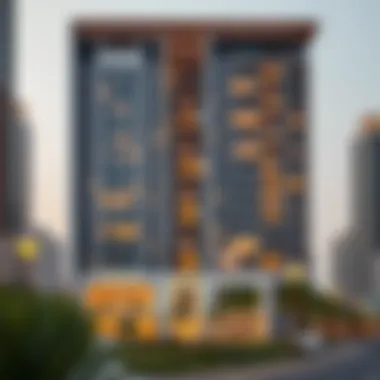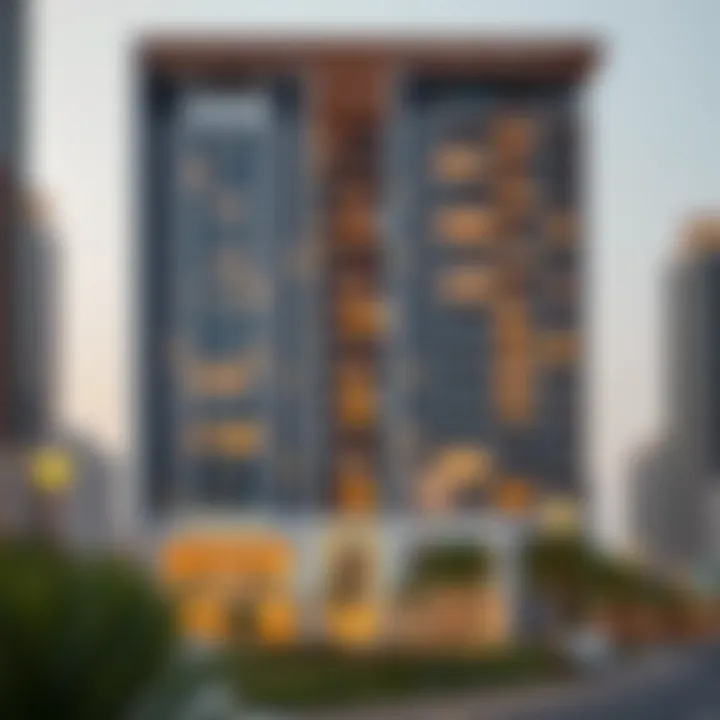Ramadan 2023 in Dubai: Insights and Economic Effects


Intro
Ramadan is a month of deep spiritual meaning for millions around the globe, but in a bustling metropolis like Dubai, its impact stretches far beyond the religious observance. It influences economic activities, especially in areas like real estate, hospitality, and retail. In 2023, as the holy month approaches, it is crucial to examine how traditions mesh with modern growth, presenting both challenges and opportunities.
The streets of Dubai will soon be adorned with festive lights, and the sounds of evening prayers will resonate throughout the city. This environment fosters a unique opportunity for businesses and investors, especially in the real estate sector, where understanding the cultural nuances of Ramadan can lead to strategic advantages.
"Real estate in Dubai isn't just about bricks and mortar—it's about understanding the culture and timing."
As we delve deeper into this article, we will detail critical market insights for Ramadan 2023, analyze the ongoing trends in property prices, and provide practical advice for those looking to navigate the property landscape during this significant period.
The aim here is to paint a picture that goes beyond mere statistics; it's about immersing oneself in the traditions, community activities, and the layered implications these have for the economy. From community gatherings to specific challenges impacting the buying and selling of properties, let’s explore the facets that define Ramadan in Dubai this year.
Understanding Ramadan
Ramadan is more than a mere period in the Islamic calendar; it serves as a profound reflection of faith, tradition, and community. In the context of Dubai, this holy month becomes a melting pot of cultural exchanges, economic shifts, and social dynamics. Understanding Ramadan, especially in 2023, becomes essential for stakeholders such as real estate agents, investors, and homebuyers who aim to navigate the economic landscapes of this vibrant city.
A few benefits to grasping the essence of Ramadan include insights into the local populace's behavior, adjustments in business operations, and shifts in consumer spending habits. Recognizing these factors can significantly influence market strategies, particularly in sectors like real estate and hospitality.
While many are aware of the spiritual significance associated with Ramadan, the attached cultural implications and economic aspects deserve attention as well. The interplay between faith and commerce during this period is complex and multi-faceted, often leading to alternate approaches in investments and community engagements.
"Ramadan is the bridge connecting every heart, shaping the way business and community interact in Dubai."
In this article, we will explore historical contexts and cultural significances surrounding Ramadan. By delving deeper into these facets, readers can gain a more nuanced understanding, guiding their decisions and enhancing their experiences during this meaningful month.
Historical Context
The history of Ramadan is rich and deeply rooted in Islamic tradition. Fasting during this month is derived from the teachings of the Quran, specifically Surah Al-Baqarah, which emphasizes self-discipline, faith, and community spirit. The origins can be traced back to the 7th century, marking the period when the Quran was revealed to Prophet Muhammad. This historical lineage not only provides a backdrop for the month’s significance but also shapes Ramadan's observance across different cultures.
Over time, various customs have emerged, distinguishing how different regions and communities celebrate Eid al-Fitr, the festival concluding Ramadan. In Dubai, with its eclectic mix of expatriates from around the world, one can witness a unique blend of customs that embodies an evolving cultural landscape. The rich heritage and evolving narratives make the historical context of Ramadan not just a tale from the past, but a living experience reflecting modern society’s values.
Cultural Significance
The cultural significance of Ramadan in Dubai can’t be overstated. It is a time when the essence of unity, empathy, and selflessness flourish. The act of fasting for 29 or 30 days transforms not only individuals but also entire communities. It’s a period spent listening to the needs of others and coming together as families, friends, and neighbors to break fast and share meals.
Moreover, Ramadan influences various cultural events and activities across the city. For instance:
- Iftar gatherings that draw people from diverse backgrounds, sharing meals to reflect communal values.
- Cultural festivals showcasing traditional dishes, arts, and music continue to thrive, promoting a sense of community that extends beyond religious confines.
- Social initiatives that focus on charity and helping those in need skyrocket during this month, further solidifying the ethical foundation of the culture.
The blend of tradition with modernity offers a compelling lens for understanding how the local culture evolves. Observing Ramadan in Dubai can become an enriching experience for those willing to engage with the various layers of traditions and celebrations. Each of these aspects creates a framework that allows both locals and newcomers to appreciate the unique harmony present in this city during the holy month.
Ramadan 2023: Start Date and Phases
Understanding the start date and phases of Ramadan is crucial for both the practicing community and stakeholders in various sectors. Ramadan is not merely a time for fasting, but it holds deep cultural and economic significance. The observances that occur within this sacred month influence consumer behaviors, real estate dynamics, and even the pulse of the local economy in Dubai.
Expected Start Date
Ramadan in 2023 is expected to commence on the evening of Wednesday, March 22, pending moon sighting confirmations. This initial moment holds great significance, as it marks the beginning of a month where families, friends, and communities come together in both spiritual and communal aspects. For businesses, keenly noting this start date is essential, as it allows for appropriate adjustments in operating hours and promotional activities. During this period, local businesses often craft unique offerings catered to the needs and customs of the month, thus tailoring their services to ensure relevance and resonance with the community.
"The beginning of Ramadan serves as an alert for businesses to engage more actively with the community and align operational strategies with cultural practices."
Phases of the Month


Ramadan is not a monolithic experience; it unfolds in distinct phases that carry different meanings and implications. Generally, there are three main phases within the month:
- Initial phase: The first ten days of Ramadan focus heavily on establishing one's spiritual discipline. During this period, many individuals are recommitting themselves to fasting and prayers, setting intentions for the month ahead. Businesses often focus on launching special promotions targeting this seeking of spiritual significance.
- Mid-phase: The second part is known as the “Mercy” phase, where personal growth and altruism take center stage. This is when charitable acts peak as individuals practice selflessness, contributing to the less fortunate. Photographs of such acts often ripple through social media platforms, enhancing a sense of community. Investors and real estate developers should take note, as building community connections during this phase can lead to long-term brand loyalty.
- Final phase: The last ten days of Ramadan are deeply celebrated for increased devotion and reflection, culminating in the important celebration of Eid al-Fitr. Many businesses ramp up their advertising and promotions during these days, seeking to attract customers gearing up for the festive season. This is an opportune time for real estate agents to host events or open houses, aligning with the celebratory spirit.
Throughout these phases, one can see the dynamic interplay between cultural observance and economic activities. Local customs, such as organizing community Iftar meals or charity drives, impact consumer habits, which in turn affects the overall business climate during Ramadan. Understanding these nuances can provide valuable insights for stakeholders aiming to optimize their strategies around this key period in Dubai.
Observances and Traditions in Dubai
Understanding the observances and traditions observed during Ramadan in Dubai is key for anyone looking to navigate the cultural landscape of the city during this sacred month. The holy month is much more than a mere practice of fasting; it embodies a rich tapestry of social connections, acts of charity, and communal gatherings. Observations during this period carry significant implications for both the local populace and the economy, particularly in sectors such as real estate and hospitality.
Iftar and Suhoor Practices
The daily ritual of Iftar and Suhoor serves as a cornerstone of Ramadan traditions in Dubai.
- Iftar is the meal that breaks the fast at sunset, and it typically begins with the consumption of dates and water. Following this, families and friends gather to share lavish meals, often featuring a plethora of local and international dishes. Such gatherings reflect the essence of community, promoting social bonding and enhancing relationships among families and neighbors.
- Suhoor, on the other hand, is the pre-dawn meal consumed before fasting begins again. It holds considerable importance as it prepares individuals for the day's fast ahead. Many choose to enjoy this meal in large groups or at well-known establishments, often leading to vibrant nighttime activities where food and culture intertwine.
Economically, this tradition spills over into the restaurant and hospitality sectors, with many eateries adapting their hours and menus to meet the demand for these meals. Consequently, restaurateurs seek to entice diners with special offerings, including buffets that showcase Emirati cuisine alongside international flavors. This can lead to significant revenue boosts for local businesses, benefitting the overall economy and, indirectly, the real estate market as well.
Community Gatherings and Activities
Beyond the culinary aspects of Ramadan, community gatherings and activities take center stage in Dubai. Local mosques host Tarawih prayers, drawing in large crowds each evening. These nightly prayers encourage participation and foster a sense of unity among community members. This shared experience highlights the social component inherent in Ramadan practices.
Ramadan tents become a common sight across the city. Often erected by hotels and larger companies, these tents offer Iftar meals, cultural experiences, and entertainment. Attending these events promotes a sense of belonging and connection that transcends socio-economic barriers. Additionally, they provide an opportunity for various businesses to showcase their services to a broader audience, making it a win-win scenario.
Furthermore, community-based charitable initiatives gain traction during this time. Organizations and individuals often come together to distribute food and aid to needy families. This culture of giving is not just a moral obligation; it is also an emotional, social, and economic catalyst, driving engagement within and between communities. Participants might find opportunities to invest in or even collaborate on local ventures, creating an avenue for future real estate developments or community projects.
In summation, the observances and traditions during Ramadan in Dubai represent a confluence of faith, culture, and economic dynamics. Acknowledging and participating in these traditions can profoundly impact one's understanding of the local culture while also unveiling opportunities for business and investment in this vibrant city.
Impact of Ramadan on Dubai's Real Estate Market
The significance of Ramadan extends beyond spiritual reflections and community gatherings; it plays a pivotal role in shaping Dubai's real estate landscape. Understanding the nuances of this relationship reveals opportunities for investors and homebuyers alike. Real estate often reflects larger societal trends, and Ramadan injects a unique dynamic into property demand, rental trends, and general economic conditions.
Property Demand Dynamics
During Ramadan, property demand dynamics undergo noticeable shifts. Contrary to popular belief, the holy month sees varied interest levels in real estate. A significant aspect is the influx of expatriates and tourists seeking temporary accommodation during Ramadan, driven by family visits and events that characterize the month. Notably, popular areas such as Downtown Dubai and Dubai Marina witness a surge in demand as families flock to these vibrant hubs for their celebrations.
- Types of Properties in Demand
In particular, there's a marked preference for:
- Short-term rental apartments
- Traditional Emirati homes available for cultural experiences
These preferences mirror the communal spirit of Ramadan, emphasizing togetherness and shared experiences. Analysts often observe a spike in inquiries for these properties as families unite to celebrate Iftar.
Moreover, developers might see a strategic opportunity during this time. Projects that align with the values of Ramadan, such as community-centric housing developments, can gain traction in the market, considering the heightened interest in cohesion and community during this sacred time.
Rental Trends During Ramadan
Ramadan influences rental trends in both subtle and profound ways. With more people actively seeking accommodations, landlords often tweak their pricing strategies to align with fluctuating demand. It’s not uncommon for rental prices to experience a temporary hike in the weeks leading up to Ramadan.
A few trends often observed include:
- Flexible Leasing Options
Landlords might provide tailor-made lease agreements that cater to families or expatriates looking for properties solely during the month. - Community Fees Adjustments
Some property owners may lower community fees to attract short-term renters.
However, it’s crucial to note that such price hikes might not sustain post-Ramadan, as the demand could dip down to normal levels after the month concludes. Investors should thus tread carefully, understanding that while Ramadan might yield higher short-term gains, sustainable investments are rooted in longer-term trends and demand fundamentals.


In essence, the interaction between Ramadan and Dubai's real estate market is a tale of adaptability for both buyers and sellers. The month brings an aspect of urgency, community spirit, and cultural significance that, when understood properly, can lead to mutual benefits in the real estate ecosystem.
Consumer Behavior and Spending Habits
The significance of consumer behavior and spending habits during Ramadan cannot be overstated, especially in a bustling metropolis like Dubai. Understanding how the cultural practices and observances associated with this holy month influence spending can provide invaluable insights for real estate agents, investors, and developers navigating the ebb and flow of the market.
As fasting hours stretch from dawn until sunset, the rhythm of daily life changes dramatically. People adjust their routines, leading to unique consumption patterns, particularly in food, hospitality, and retail sectors. To dive deeper into these shifts, we can break them down into two primary areas: shopping trends and investment opportunities in entertainment.
Shopping Trends During Ramadan
During Ramadan, shoppers exhibit distinct tendencies that reflect their cultural and religious observance. It’s not merely about stocking up on groceries; it's about celebrating the spirit of the month. Here are some key trends observed in consumer shopping habits:
- Increased Grocery Purchases: Families stock up on food for Iftar and Suhoor, leading to a surge in the sale of dates, fresh produce, and ready-to-eat meals. Supermarkets and local markets often adapt by extending their hours to accommodate late-night shoppers.
- Luxury Spending: It might seem counterintuitive, but many consumers indulge in luxury items in Dubai, especially as gifts exchanged during the Eid celebration. High-end retailers often introduce special Ramadan collections, attracting affluent buyers eager to celebrate the month in style.
- Discounts and Promotions: Retailers in Dubai capitalize on the festive atmosphere by offering special promotions and discounts. This not just boosts sales but also fosters a sense of community. Shoppers tend to gravitate towards stores that embrace the Ramadan spirit with themed marketing.
“Shopping in Ramadan is more than just buying; it's sharing and celebrating,” says local retail analyst Omar Al-Farsi.
These dynamics paint a picture of how consumer behavior shifts during Ramadan, reflecting both tradition and modernity.
Investments in Hospitality and Entertainment
Ramadan is a fertile ground for investment opportunities, particularly in hospitality and entertainment sectors. As the month progresses, themes of community and togetherness drive consumers to seek spaces that enhance their experience. Here are a few noteworthy considerations:
- Dining Experiences: Restaurants and hotels typically launch unique Iftar menus that cater to the communal dining experience. Venues that focus on ambiance and cultural authenticity can attract a steady flow of patrons, thus enhancing their profitability.
- Entertainment Events: From cultural festivals to concerts, the marketplace for entertainment during Ramadan expands. Investors can capitalize on this by supporting events that resonate with the community’s values. The demand for entertainment rises, presenting an opportunity for businesses to diversify and offer engaging acts.
- Short-term Rentals: Increased visitors and family gatherings lead to a spike in demand for short-term lodging. Investors in the real estate sector might consider tapping into this market by offering well-furnished, community-centric accommodations that appeal during the month.
Overall, consumer behavior during Ramadan in Dubai is an intricate web of tradition, community, and modern consumerism. Both shoppers and investors must navigate these shifting landscapes thoughtfully, keeping comfort and cultural significance at the forefront. This unique blend of trends not only impacts the economy but also enriches the social fabric of the city.
Navigating Business Operations During Ramadan
Navigating business operations during Ramadan is crucial, especially in a bustling metropolis like Dubai, where cultural practices intertwine with economic activities. As the holy month unfolds, businesses encounter unique challenges, but also opportunities that can contribute to both employee well-being and company growth. Understanding how to adjust operations effectively can enhance productivity while adhering to the values and traditions of Ramadan.
Adjusting Work Hours
One of the most significant adjustments that companies make during Ramadan is altering work hours. Government regulations typically mandate shorter workdays for employees observing the fast, which allows them to balance their professional responsibilities with spiritual observance. In Dubai, the standard work hours during this period can be reduced to about six hours, usually from 9 AM to 3 PM.
This change impacts not only the daily rhythm of businesses but also how they plan and execute projects. For example, many organizations may shift meetings to the early hours of the day when energy levels are compelling. Companies can manage workloads by prioritizing tasks that require higher concentration during the morning and reserving more routine activities for the afternoon, when the energy levels might dip.
In adjusting work hours, enterprises must ensure clear communication is maintained among team members. This may involve recalibrating communication tools and methods, so all staff can stay on the same page without feeling overwhelmed.
Corporate Social Responsibility Initiatives
In a city as diverse as Dubai, engaging in corporate social responsibility (CSR) during Ramadan can resonate well beyond the business's immediate vicinity. This month is often viewed as a time for reflection and giving back to the community, making it an opportune moment for businesses to demonstrate commitment through various initiatives.
Popular CSR activities during Ramadan include:
- Food drives: Companies can organize food packages for less privileged families or collaborate with local charities to distribute meals during Iftar, the evening meal breaking the fast.
- Healthcare initiatives: Businesses may host health check-up camps or wellness workshops focused on fasting-related concerns and mental health, fostering a culture of care and support.
- Education support: Offering scholarships or sponsoring educational programs ethical aligns with Ramadan's spirit and showcases a commitment to societal growth.
Engaging in such initiatives not only strengthens brand reputation but also fosters employee engagement. Workers often feel more connected to organizations that actively contribute to society. This can lead to increased job satisfaction and lower turnover rates, as employees appreciate working for a company that resonates with their values.
"The fabric of any society is woven with kindness and generosity; Ramadan is a reminder for companies to partake in that weaving."
Health and Well-being Considerations


The significance of health and well-being during Ramadan extends beyond mere fasting. It plays a vital role in the daily lives of millions, especially in a dynamic city like Dubai. The holy month challenges traditional habits and encourages individuals to focus on physical health and mental stability through various disciplines and practices. These adjustments can lead to holistic improvements in lifestyle and contribute to the community's overall well-being.
Fasting and Health Impacts
Fasting during Ramadan is not just a religious obligation; it is a profound exercise in self-discipline and mindfulness. The act of abstaining from food and drink from dawn till dusk can produce notable health effects. When done mindfully, fasting can have positive impacts, but it's essential to approach it with care.
Key health considerations include:
- Hydration Levels: It’s crucial to maintain hydration during non-fasting hours. Dehydration can lead to fatigue and decreased alertness, particularly in the hot climate of Dubai.
- Nutritional Balance: After a day of fasting, what’s consumed during iftar should be balanced. Foods rich in complex carbohydrates, proteins, and healthy fats should be prioritized to sustain energy levels throughout the night.
- Gastrointestinal Health: Gradually reintroducing food after fasting helps to ease digestion and prevents discomfort. Eating too quickly or consuming heavy meals can lead to health issues.
Beyond the physical, fasting also has spiritual and psychological benefits. Some studies indicate that fasting can improve metabolic health, positively affecting cholesterol and blood sugar levels. In addition, many find peace and clarity through this form of self-regulation, reinforcing a sense of community and belonging.
Mental Wellness During Ramadan
Ramadan is often viewed as a time for deep reflection and rejuvenation. The fasting period allows individuals to disconnect from the stresses of everyday life and focus inward. This alignment can lead to significant improvements in mental wellness. However, it’s essential to recognize that not everyone experiences this positively. Some may face challenges during this time.
Important factors to consider include:
- Increased Stress Levels: The altered routine can increase stress. Balancing work responsibilities while adhering to fasting can be tough. Acknowledging this and finding coping strategies—such as time management or prioritizing self-care—becomes vital.
- Community Support: Engaging in community activities during Ramadan can enhance mental health, providing connection and support. Whether through communal iftars or volunteer work, fostering connections helps to alleviate feelings of isolation.
- Mindfulness Practices: Many find solace in prayer and meditation during Ramadan. These practices can significantly reduce anxiety and promote a sense of well-being, contributing to overall mental stability.
“The month of Ramadan is a month of reflection, betterment, and commitment to community.”
Understanding and addressing health and well-being considerations during Ramadan helps individuals navigate this sacred time thoughtfully, promoting not just adherence to traditions but also fostering a balanced and healthy lifestyle. By focusing on both physical health through proper nutritional choices and mental wellness through community engagement and mindfulness, one can truly embrace the spirit of Ramadan.
Long-term Effects of Ramadan on Dubai
The long-term effects of Ramadan on Dubai deal with both cultural and economic fronts, influencing traditions and development alike. This holy month garners a unique position in the city's identity. Over the years, celebrations related to Ramadan have evolved, shaping not just local customs but also bringing broader implications for investors, real estate agents, and community-driven initiatives.
Cultural Evolution of Ramadan Celebrations
Ramadan celebrations in Dubai are far from static; they breathe and shift over time. The cultural landscape is a canvas painted by generations. Communities across the UAE integrate older traditions whilst embracing modern practices. For example, the once simple act of gathering for Iftar has transformed into lavish gatherings held in hotels and restaurants, fulfilling both community spirit and economic needs.
- Emerging Trends: New elements, like food festivals and cultural exhibitions, emerge during Ramadan, reflecting Dubai's vibrant mix of tradition and modernity.
- Diversity in Influence: The festival's observance is enhanced by the city’s multicultural fabric, with various nationalities contributing to the richness of Ramadan celebrations.
- Focus on Community: The communal aspect remains paramount, with families and friends coming together, making shared meals, and hosting charitable events, showing the essence of compassion.
Overall, the cultural evolution of Ramadan within Dubai facilitates deep connections among its residents and visitors, while also sustaining local businesses.
Sustainable Development and Ramadan
Sustainable development during Ramadan presents a crucial aspect, where the focus is on responsible celebrating. As sustainability takes center stage globally, Dubai harnesses the spirit of Ramadan to initiate various programs promoting eco-friendly practices. Companies are not merely concerned about profits; they are also aligning with corporate social responsibility initiatives during Ramadan.
- Eco-Friendly Initiatives: Many hotels and restaurants develop new, environmentally friendly practices to minimize waste from Ramadan feasts, encompassing a shift to using biodegradable materials.
- Community Engagement: Partnerships between businesses and local organizations foster community-driven sustainability projects aimed at enhancing awareness. This practice enfolds critical discussions around resource conservation during this holy month and beyond.
- Long-Term Impact: The long-term impact could lead to a cultural shift where sustainable practices are ingrained in Ramadan traditions, fostering a city-wide movement towards greener living.
Finale: The Significance of Ramadan in Modern Dubai
Ramadan holds a deep-rooted significance in Dubai, transcending mere religious observance to touch nearly every aspect of life within the city. This month-long period of fasting, reflection, and community is pivotal for the Emirati culture and its economic landscape, creating a unique juxtaposition of spirituality and consumer activity.
At its core, Ramadan serves as a reminder of empathy and humanity. Commuters in Dubai navigate their daily routines with a profound sense of understanding for those fasting. This period leads to various acts of charity and community service, reinforcing social bonds within neighborhoods. The culture of giving flourishes, with initiatives aimed at feeding the less fortunate becoming common. Consequently, businesses often engage in Corporate Social Responsibility practices, aligning their efforts with the spirit of the month, enhancing their brand image while contributing positively to society.
From a consumer behavior perspective, Ramadan also heralds noticeable changes in spending habits. Retailers often report increased sales, especially in the food and beverage sectors. Shopping centers fill up with families purchasing ingredients for iftar meals, thus reflecting both cultural and economic implications. For real estate agents and investors, this month may serve as an indicator of market vibrancy, with potential shifts in demand for residential and commercial properties driven by temporary influxes of seasonal workers and tourists.
Key Insights on Economic Implications:
- Increased Hospitality Demand: Hotels and eateries see spikes in patronage during iftar, providing an uptick in hotel revenues.
- Real Estate Observations: Changes in rental prices during Ramadan can signify the health of the market as expatriates seek to make movements before or after the holy month.
- Community Engagement: Events such as food bazaars and cultural festivals draw locals and visitors alike, positively impacting visitor economy.
Ramadan is also a time when many businesses alter their operations, adapting to accommodate the needs of their employees. Work hours are often adjusted, allowing staff to partake in iftar gatherings. These modifications reflect a growing acknowledgment of work-life balance, a critical aspect of employee welfare that organizations in Dubai are beginning to embrace more fully.
As the city evolves, the significance of Ramadan within the fabric of Dubai society is increasingly prominent. The intersection of faith, community, and commerce illustrates how this month can shape societal values and, simultaneously, economic directions.
In summary, understanding Ramadan's multifaceted impact sheds light on its role beyond spirituality; it significantly influences the city's pulse, reflecting how culture and commerce are interwoven. For real estate agents, investors, and stakeholders, there lies invaluable insight to be gained by observing the patterns and shifts that occur during this holy month, guiding strategic decisions well into the future.















